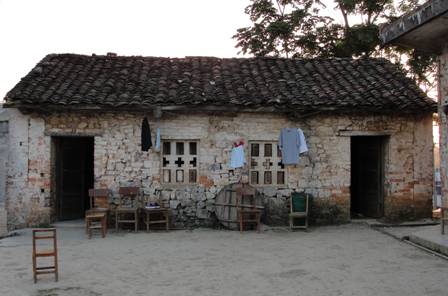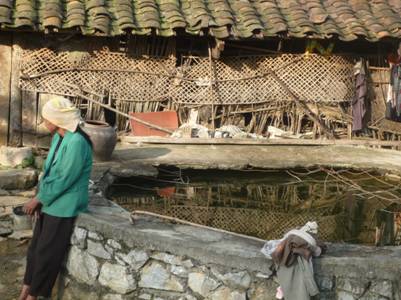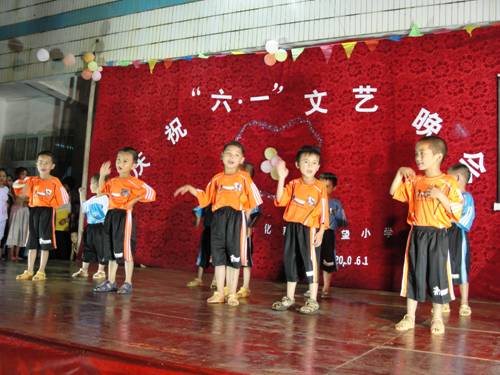A GEM Employee’S Record of Teaching
In May this year, I became a supportive teacher in Shanxi in response to the call of the company. This is a charitable event jointly organized by CSRC Shenzhen, GEM and China Merchants Securities, with CSRC Shenzhen as the leader. The teaching started in May and ended in July, lasting for two months. Although the duration is not long, that part of life has been deeply engraved in my memory.
1. Narong Primary School
The school we taught in is Narong Primary School located in Guohua Town, Pingguo County, Baise City, Guangxi. It is in the mountain of Pingguo County and was not accessible to roads until 2007. People in the village mainly live on planting corn, which is not a kind of industrial crop. So many of them leave the village for work.
Difficult conditions
Although I had prepared myself for difficulties before arriving here, I was still taken aback when I saw the mottled walls and spider-web-covered dormitory upon my first arrival to Narong Primary School.
Figure 1 Dormitory where teachers live
The worst part is I could not take a shower for a week. Since the school is in the mountain, there is no water pool or well. People live by accumulating rain water. Fortunately, we could rely on the mineral water donated by a company earlier before at the time of the great drought in Southwest China, or even the cooking would have to depend on rain water. Actually villagers here live by accumulating rain water, which dawned on me that we teachers were living a much happier life. Besides, they eat corn paste every day, and only a few of them can eat rice. I remember I was totally shocked by the living conditions of a Yao village when I visited there. Their houses were empty, no property at all. The asset would not exceed 200 yuan, and they fed on a small number of corn planted on the hillside.
Figure 2 The residence of the Yao villagers. The rainwater reservoir in the figure contains all the domestic water
“Burdensome” work
In that “busy” two weeks, our main job was to teach students absolutely. Above that, there were Children’s Day parties and family visits. We taught nearly all the “secondary subjects” in Narong School, including music, art, sports, information technology, and science. Children were not afraid of us at all, maybe because we are not demanding enough. We spent nearly half of the time of each class in disciplining students, leaving us not much time for teaching. Luckily, I also gave a tutoring class of math for the sixth grade, which somewhat made up for some shortcomings. I felt a sense of accomplishment when I was giving the lesson. Students listened to me very carefully and took notes, which made me feel I was a great person.
When I just got here, the principal assigned me a mission - organizing a variety show for the Children’s Day. That was just two weeks before the Children’s Day, but we hadn’t picked even one single program. Fortunately, the kids were very interested in the show, and soon we submitted our program list. The female teachers spent two weeks rehearsing the programs with children under the scorching sun. The children were very earnest, and kept practicing after going home. But, unfortunately, it rained in the evening on June 1. An hour later, the rain stopped and kids were finally able to make their appearance. Seeing the kids trying so hard to perform, we were very satisfied. That was a night of fun, both for kids and for us.
Figure 3 “Ji Gong” performed by first-year students at the party for the Children’s Day
Apart from teaching, we also visited students’ family to understand their life. I had five family visits during these two months. During the visit, their parents were very hospitable, and treated me with chickens and mutton. Of course, some visits were grieving. I remember Pan Yuying who was in the second class of the sixth grade. Her father died two years ago and her mother had to raise five children alone, so her family situation was very difficult. However, it is gratifying that her brothers and sisters study hard. Pan Yuying got the highest score in every exam. Now she is only a primary school student. When she gets to senior high school or even college, the financial burden will be heavier. But luckily, a teacher, who is the coworker of one of my colleague surnamed Guo, is willing to subsidize her till she completes her study. We also sincerely hope that Pan Yuying will be admitted to a university and leave this mountain.
Happy life
Despite of all the difficulties and hard work, the life in Narong was happy.
Children invited us to play balls after school, including badminton, basketball, and table tennis. Teachers would accept that invitation gladly. Children here love sport, and many of them are true sporters, while children in cities are trapped in the room, playing games or watching TV everyday. Children here seem to be happier in this regard.
In Narong, the sky is clear, and you can seven see fireflies and stars at night. Sometimes we hung around all night to watch stars and fireflies.
2. Wesley House of Love
The Wesley House of Love was discovered by the supportive teachers in the last batch. In fact, it is an orphanage to be exact, established by the Wesley Foundation of the United States, and it houses 96 children who have lost their parents. The orphanage is run by a 25-year-old young man surnamed Shen, who graduated from Zhongnan University of Economics and Law and believes in Christianity. We always sighed: He paid so much for the children in this place, and lost too much as well. But he said: Nothing is more important than getting the love of students here. There are also five young teachers in the orphanage, all of whom are Christian believers. Sometimes, faith makes people live in the way they truly want.
Every Saturday, we went to Wesley to see the children and accompany them. But every time when I saw those children, I felt more painful from the inside. Compared with the children in Narong, the children in Wesley are more introverted, and they barely speak. The children here have one common characteristic. They need hug. At the beginning, we were all confused. Then we realized the children need love, so they need us to touch them and hug them.
These children are so mannerly. They offer their seats to guests and actively greet us. Beds are tidily made, and shoes are placed orderly on the shelf.
Each child here only has 35 US dollars a month as living expenses. There is not much left after deducting the expenses for food and utilities. The children have few chances to leave the orphanage. On one hand, there is no sufficient funding. On the other hand, they are unwilling to or afraid of communicating with children out there. The dean said he could sense strong self-abasement inside those children when they were communicating with other children. Considering this, we immediately decided to take those children to boat in a nearby park. That was all we could do. We could only take as many as 18 children, and the park was the farthest place we could go to. At that moment, I strongly felt the razor-thin power of individuals and the very limit of our doings. I only hope that boating will leave a good memory for those children.
3. Recall
Looking back on the life in these two months, I felt filled with emotions in my heart. The life in Narong taught me a lot, like cherishing life, and working hard, not only for myself, but for those kids.
Every time I complain about my unsatisfactory life, I will think of the time there, and I feel there is nothing to complain about. I should be satisfied with such a beautiful life I have, to be able to sit in a spacious and bright office, eat fragrant rice, and shop with my friends and families.
Although I don’t have more power to change anything there, I still expect to do whatever I can do to make a difference. Our country is not wealthy enough to offer better education to every child. Only by hardworking can we make our country richer and give those poverty-stricken children better education resources.
Here, I hope more people can offer their hands as much as they can to help the children in poverty-stricken areas, both by donation or subsidies. Although these supportive teaching activities may seem insignificant to us, they are so helpful to those children. Also, this supportive teaching activities allowed me to train myself and gain precious life experience as a front-of-the-house rural teacher.




